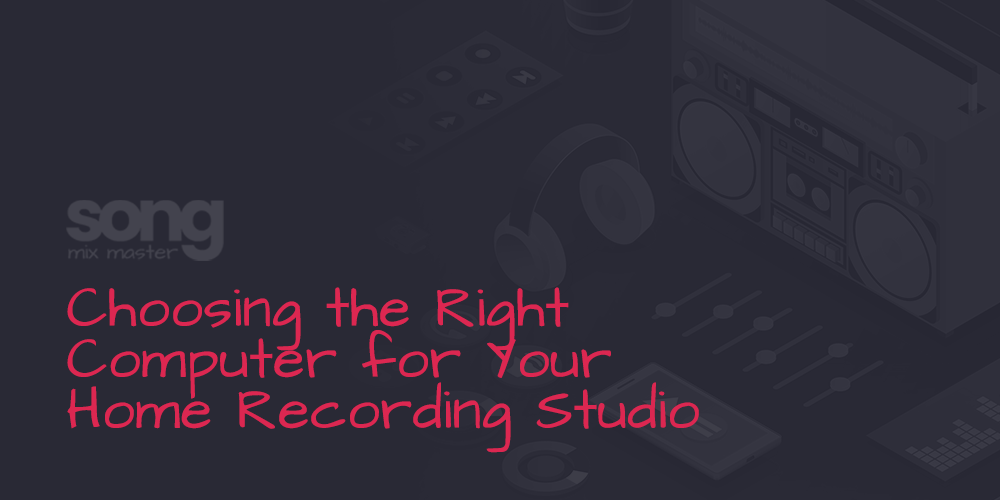Recording, Studio Setup
Choosing the Right Computer for Your Home Recording Studio
When setting up a home recording studio, one of the most crucial decisions is choosing the best music computer. Most computer stores offer standard equipment that may not be optimized for audio recording.
To make a smart purchase, it’s essential to consider your needs from the start. In this article, we’ll provide you with valuable tips to help you make an informed decision.
1. Choose the Software First
One often overlooked aspect of setting up a home recording studio is selecting the audio recording software, also known as a DAW (Digital Audio Workstation), before purchasing the hardware. This approach may seem counterintuitive, but it has its advantages.
Each DAW has its own system requirements. By choosing your software first, you’ll have a clear understanding of the minimum specifications your audio computer needs to meet. For example, Pro Tools, Ableton Live, and Reaper have different requirements. Choosing a music computer that exceeds these requirements allows for future software updates without needing immediate hardware upgrades.
Also read: Best DAWs for Music Production
2. PC or Mac?
The age-old debate between Windows PCs and Macs in the world of home recording studios is similar to the argument of whether a potato omelet should have onions. Both have their passionate supporters, and it ultimately comes down to your specific needs and preferences.
Advantages of Mac:
- Durability: Macs tend to have a longer lifespan, making them a solid investment in the long run.
- Stable Operating System: macOS is known for its stability and reliability, as it’s designed for a specific range of hardware.
- Solid State Hard Drive: Macs come with solid-state drives (SSD) by default, offering excellent performance.
- Quality Construction: Apple products are renowned for their build quality and customer support.
- Included DAW: Macs come with Garageband, a great starting point for beginners in audio recording.
Disadvantages of Mac:
- Higher Initial Cost: Macs can be more expensive than PCs with similar specs.
- Limited Upgradability: Most modern Macs have components soldered to the motherboard, making upgrades difficult.
Advantages of PC:
- Full configurability: You can customize a PC to your exact needs with various components.
- Easily Upgradable: PCs are typically easy to upgrade, allowing you to extend their lifespan.
- Lower Initial Cost: PCs can offer similar performance at a lower upfront cost.
Disadvantages of PC:
- Less Stable System: While Windows has improved in terms of stability, it’s generally not as robust as macOS.
- Greater Configuration Complexity: Tasks that may be straightforward on Macs can be more challenging on Windows.
- Lower Component Performance: PCs may have more powerful components for the same price, but they might not always perform as well as Macs.
My Recommendation
As someone who transitioned from Windows to Mac over a decade ago, I’ve found Macs to be a great choice for home recording studios due to their durability, stability, and quality. However, I acknowledge that many Windows users are content with their setups and wouldn’t trade them for anything.
The choice of computer for your recording studio ultimately depends on your personal preferences and requirements. Consider your budget, the specific software you plan to use, and your long-term goals.
Also read: 10 Recording Mistakes to Avoid in Your Home Studio


Disclaimer: Any references to any brands on this website/webpage, including reference to products, trademarks, brands and companies, are provided for description purposes only. We don't have any association with or endorsement by these brands or companies. Some of the links on our blog may be affiliate links. This means if you click on these links and make a purchase, we may earn a commission at no extra cost to you.
Need Professional Mixing & Mastering?
You may also like to read...
My In-Depth Review of the SSL Sourcerer Plugin
Audio Mastering with Artificial Intelligence: The Future of Sound
Multiband Compression: Techniques, Tips, and Top Plugins
Mixing Vocals: How To Use The Waves R-Vox Compressor
10 Best Headphones for Studio Recording, Mixing, & Mastering
How To “Glue” Your Mix Using the SSL Bus Compressor by Waves